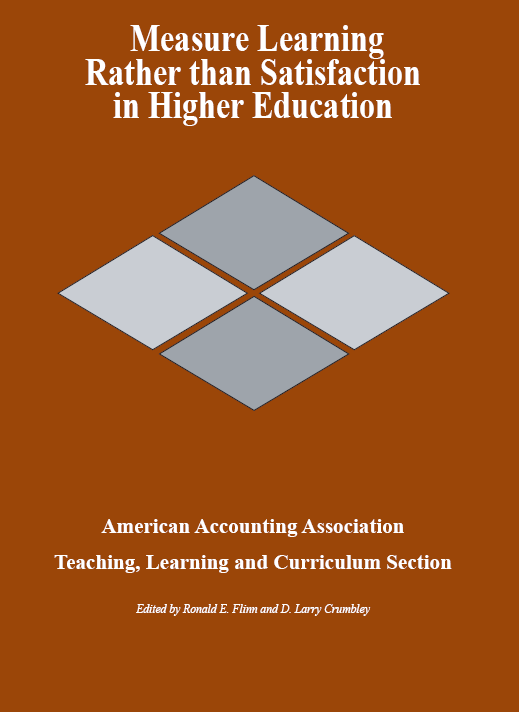


Measure Learning Rather than Satisfaction in Higher Education |
|
 |
The Teaching, Learning & Curriculum Section of the American Accounting Association has recently published a scholarly monograph with thirteen articles that attack the widespread misuse of student evaluation of teachers (SETs) by administrators. SETs are those anonymous accounting control questionnaires that professors have to hand out to their students each semester. Professors today are hired, fired, rewarded, promoted, tenured, punished, and fired largely based on student satisfaction opinions at the end of each semester about their professor’s teaching. In the Preface co-editor Ronald Flinn and Larry Crumbley say that professors are no longer in the learning/teaching business, but rather are in the satisfaction business. In an interview, Dr. Crumbley at Louisiana State University says the dysfunctional education system based upon the misguided concept that students are customers has allowed “the inmates to be in charge of the prison.” Students are inventory, not customer. You would not allow the cars at the end of a General Motors assembly line to fire a worker. You would have someone check the automobiles to see if the worker is performing his or her task effectively. We need to determine if students are learning, not whether they are satisfied with their grades. |
|
This destruction of higher education is caused by legislators for public universities and Boards of Trustees in private universities telling administrators to evaluate the teaching effectiveness of university professors, and they in turn hire the inventory (students) to evaluate (e.g., audit) the professors. While using students in this manner may be an inexpensive and quick way to evaluate professors, this method does not measure learning. In fact, this system has reduced respect for professors and the higher education process. Administrators prefer higher SETs scores, which lead to higher grades, higher student retention rates, and more tuition and tax revenues and bigger salaries for administrators. Likewise, even though administrators have sprouted like rabbits and their salaries have skyrocketed, they refuse to do their administrative duty and observe their faculty in the classroom. Instead, they will spend 15 minutes once a year reviewing the ranking of the professors by the student satisfaction evaluations, and then they are off to the golf course or tennis court. Professors, of course, face the classic prisoners’ dilemma each semester. Be tough, grade hard, and you get bad evaluations. If all professors inflate their grades and deflate their coursework, each professor gets slightly higher evaluations. As a result, there is severe grade inflation throughout the U.S. A’s are now common as dirt. In the words of Charles Murray, “dumbed down courses, flaky majors and grade inflation have conspired to make the letters B.A. close to meaningless. The light workload alone can make college today a joke.” He believes the “demanding professor is close to extinct.” A Duke University English professor Cathy Davidson, a former administrator, now allows the students to determine their own grade. As Robert Haskell says in his article in the monograph, we have had enough research on SETs, because we will never reach a scientific level of certitude. “If the control mechanism is not constrained, this dysfunctional system will continue to endanger the integrity of tenure, promotion, and academic freedom.” It is up to administrators to prove this control device is valid, not professors. And they can not show this proof. Professor Flinn and Crumbley encourages governors and others concerned with the integrity of higher education and student learning to scrutinize the current internal control mechanism that allows administrators to increase retention rates at the expense of learning. As administrators multiply, their salaries skyrocket, tenure-track professors decrease, and adjuncts increase, governors and Board of Trustees must realize that it’s the control system, stupid. The system has become so dysfunctional and corrupt that Michael McKinney, Chancellor of the Texas A&M University has instituted a bonus system giving professors up to $10,000 based on student evaluation. These consumer/satisfaction bonuses go to the top 15 percent of the faculty. Certainly a fine performance system to increase retention rates and destroy student learning. The monograph Measuring Learning Rather than Satisfaction in Higher Education can be obtained from the American Accounting Association, 5717 Bessie Drive, Sarasota Florida 34233-2399.
TLC members: Free Non-members: $15.00
Table of Contents & Preface for the Teaching, Learning & Curriculum Monograph |
|